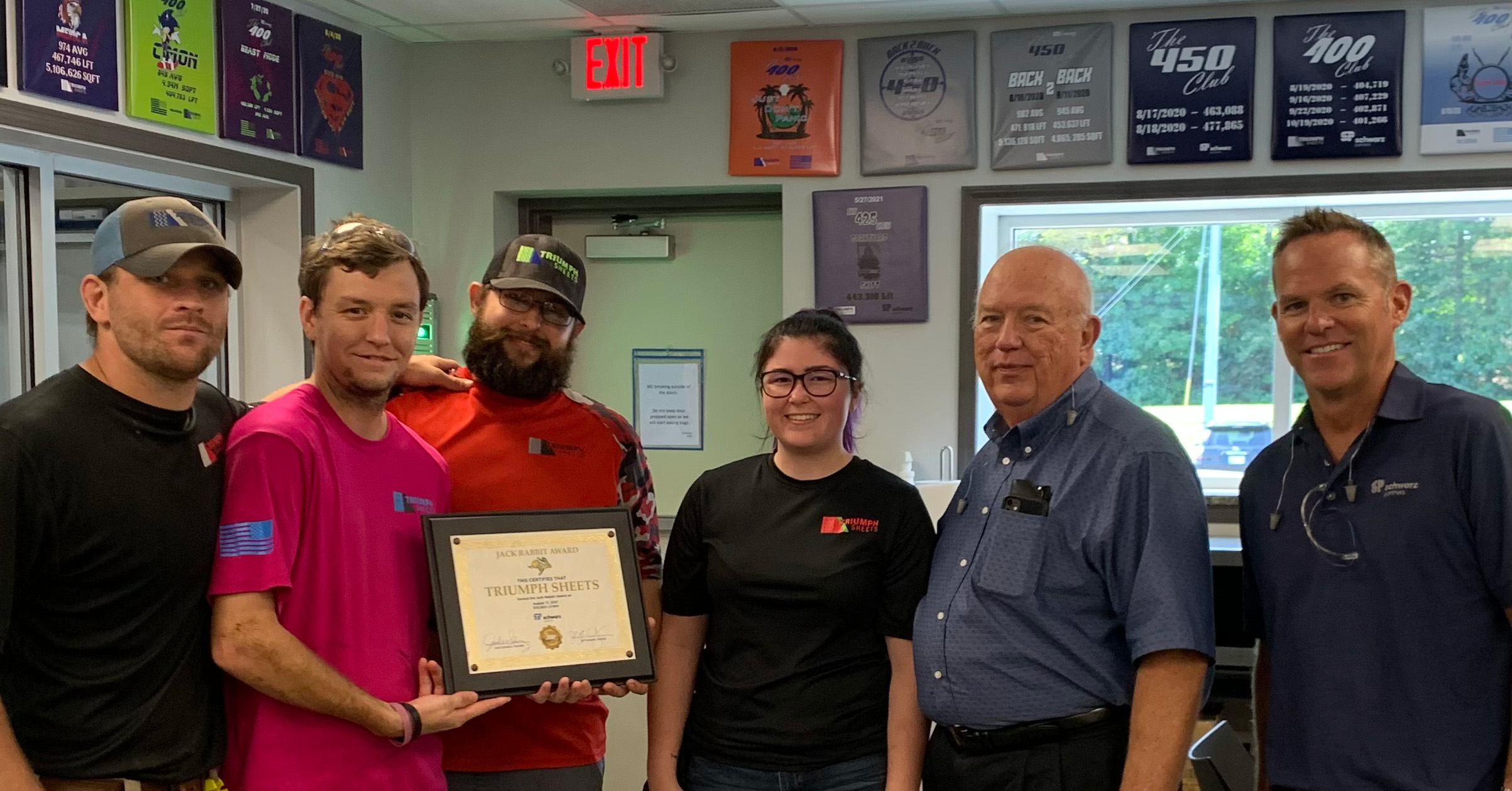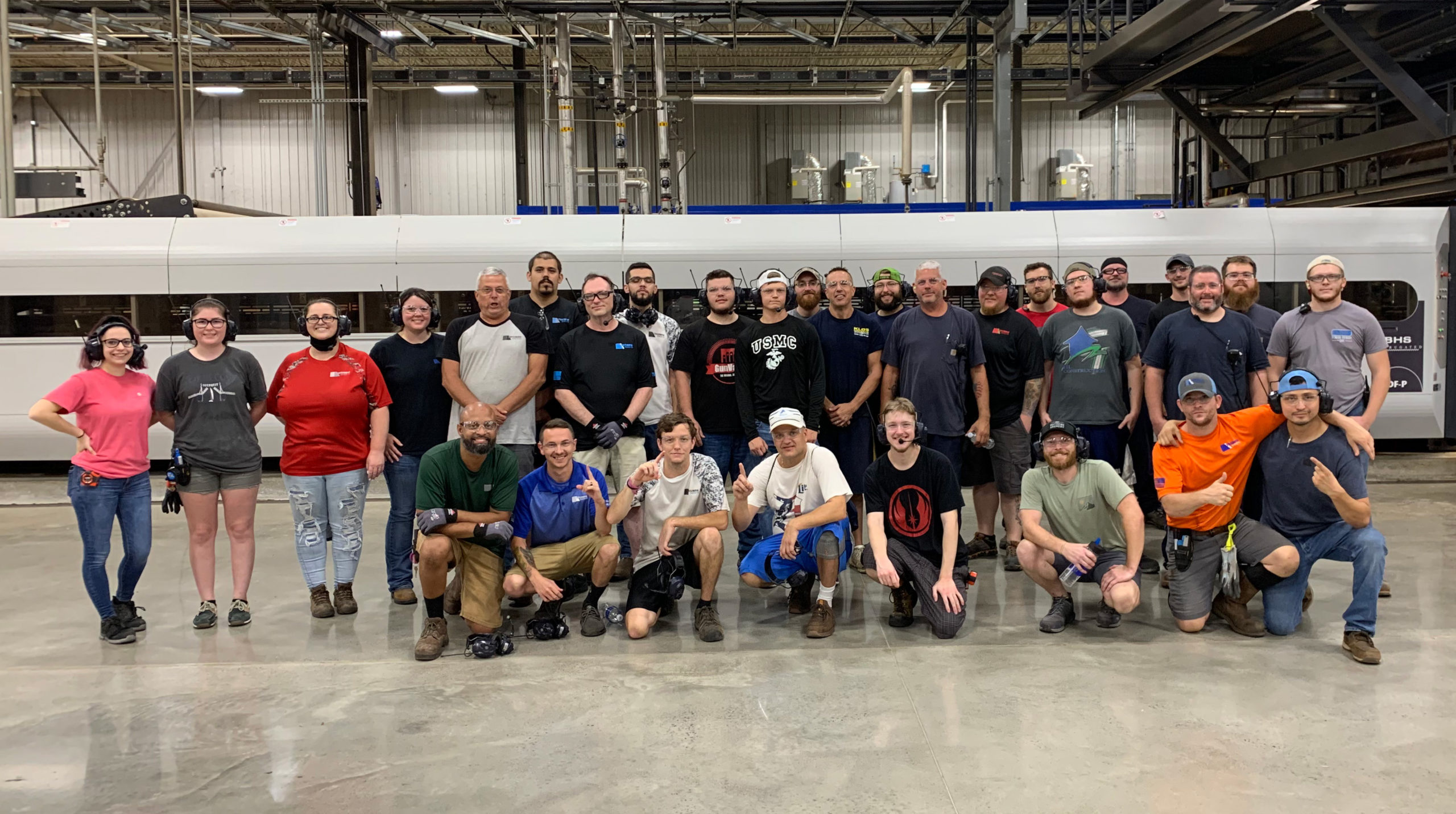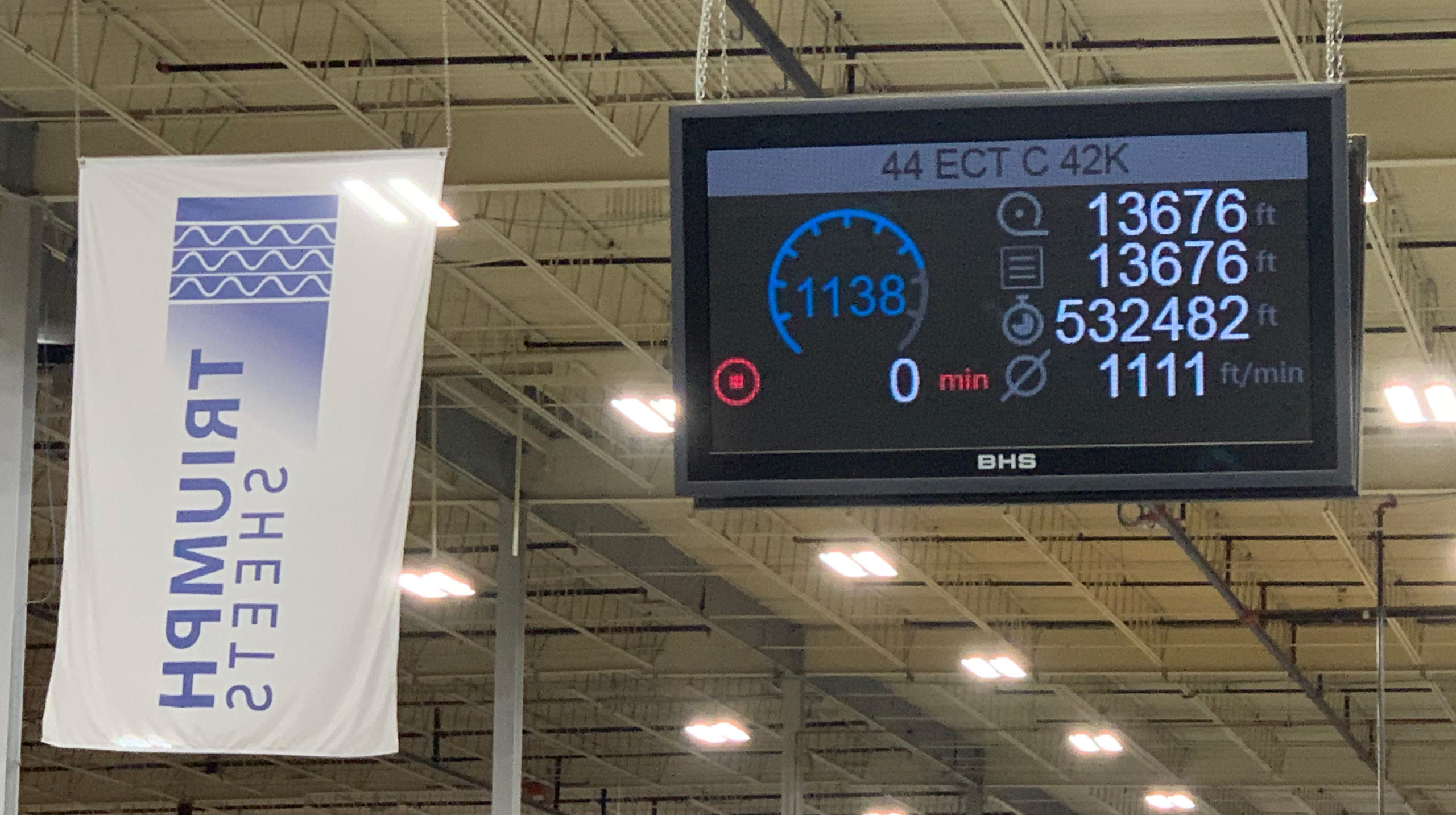Chase ’em, Jack Rabbits!
The story behind the coveted award that honors the best sheet feeder team and fastest run in an 8-hour shift
It all began back in 2012 when Doug Shaeffer, general manager of Alliance Sheets, was talking to the late Terry Paulson at the Heartland Sheets plant in Kansas City. Terry, who would later become Schwarz Partners’ vice president of manufacturing, was looking for a way to energize and motivate people. “He said, ‘You always need a rabbit — someone who’s going to run the best and let everybody chase ’em,’” Doug explained. “You need a shift that’s going to set the pace for others.”
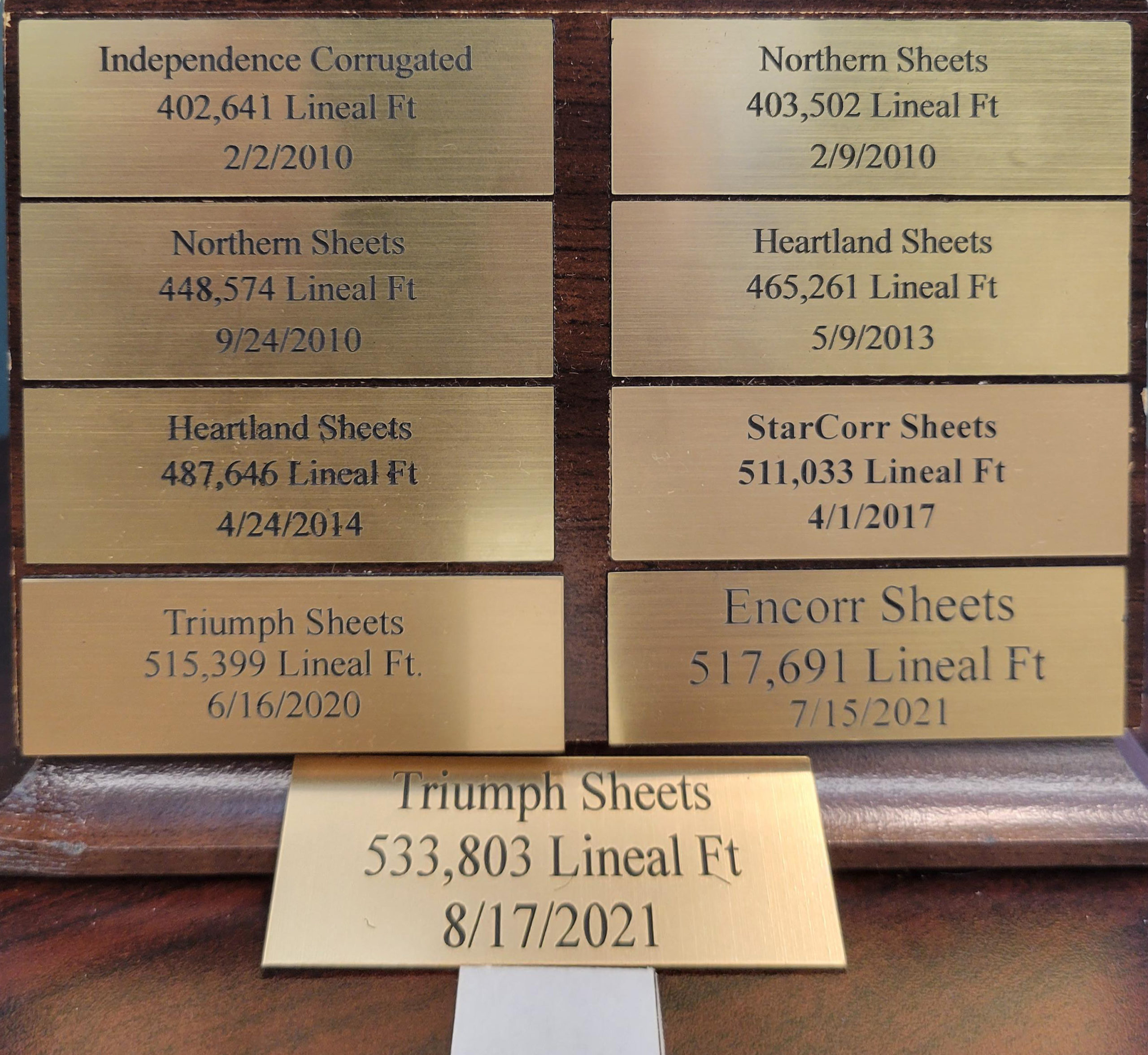
That spirit of healthy competition is at the heart of the “Jack” Rabbit Award, which honors the team and plant that produce the greatest number of lineal feet of corrugated sheets in an 8-hour shift. “It’s all about inspiring people to be their best and supporting our vision to be the best corrugated company in the industry,” said company founder Jack Schwarz. Though the competition kicked off at Heartland Sheets in 2012, the trophy backtracks to 2010 include previous records and has changed hands seven times. As of December 2021, the award has changed hands seven times. In this Q&A, learn more about the Jack Rabbit Award and why it equates to royalty in the Schwarz Partners sheet feeder world.
Why is it called the Jack Rabbit?
It’s named for Schwarz Partners founder Jack Schwarz, and for Terry Paulson’s belief that “You always need a rabbit — someone who’s going to run the best and let everybody chase ’em.”
How does the award support the Schwarz Partners vision?
“Our vision is to be the best corrugated company in the industry,” Jack said. “This award supports our vision by inspiring people to be their best. People work hard and try to do a good job. When they receive the award, they’re proud to be acknowledged as the most productive plant. It’s great to set a goal and see people strive to reach it.”
What happens when people win?
The runner-up packs up the trophy and sends it to the new winner, who gets a new plaque engraved and adds it to the trophy. The plaque includes the plant’s name and winning record. “It’s a lot like packing up the Superbowl trophy,” said Craig Fisher, vice president of the sheet feeder division. Plants celebrate in their own way by printing banners and T-shirts and hosting lunches. Sometimes Jack Schwarz makes a trip out to the plant to have lunch with the winning team.
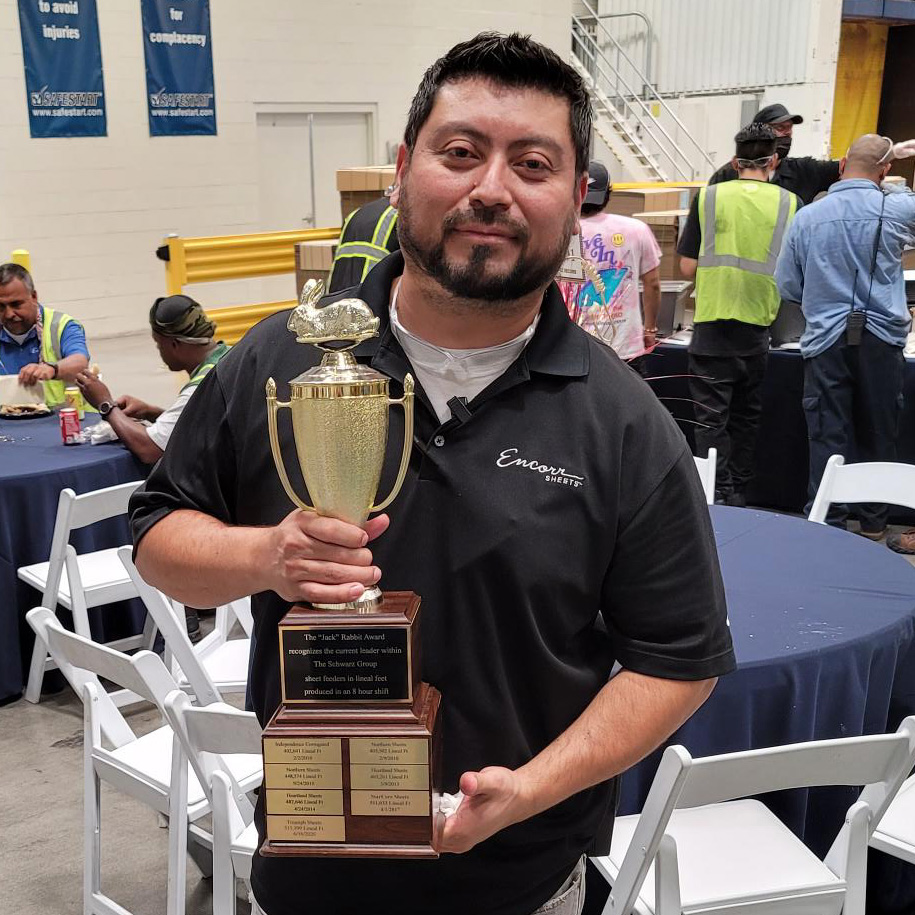
Who’s the most recent winner and runner-up?
Triumph Sheets captured the trophy from Encorr Sheets on August 17.
Why does it measure lineal feet?
Different corrugators have different widths. There are 98-inch, 110-inch and 112-inch machines, and three 132-inch corrugators at different sheet feeder plants. “If the award went by square feet, it wouldn’t be fair,” Doug said. “We tried to make the competition as fair as we could. Going by lineal feet evens things up. We also wanted something that could be passed from plant to plant.”
Do the plants have the same chance to win?
“When I look at this business, it’s pretty simple. It’s all about well-trained team members operating well-maintained equipment,” Doug said. Yet some plants have more advanced technology and produce at higher rates. “Different machines have different top speeds. Some produce 1,000 feet a minute. Some produce 1,400 feet a minute. It can be tough for 1,000-foot-per-minute machines to participate,” Doug said. But it’s not all about the machines. “You’ve got to want to win.”
What are some variables that can affect speed?
Paper changes and flute changes on the corrugator can make an impact because you have to slow down for them. “Sheet feeders typically do 130-200 order changes in eight hours,” Doug explained. “Box plants may only make five changes in an eight-hour shift.”
Downtime and equipment issues can be a factor, too, said Mark Miedema, general manager at Encorr Sheets in Ontario, California. “Every piece of it matters,” he said. “From a machinery perspective, everything has to be maintained properly. One day the team had problems with a slitter that caused a slowdown at changeover.” On a different day, after installing a new knife, the team hit a record even though it had some downtime.
“The people side matters, too,” Mark said. “Everyone has to be paying attention. You’re running so fast, there’s lots of product coming off, and you’re preparing the wet end and tailoring the dry end. You’re shipping and loading as quickly as possible, so everything flows at 100%. When we go for the award, we run 25% more than we would on a solid shift. That’s significant.”
Why is the award so special?
“The team talks about what’s stopping them, and how to perform better tomorrow,” said Bobby Hunter, general manager at Triumph Sheets in Cleveland, Tennessee. “When you set a challenge like the Jack Rabbit in front of them, and they have an opportunity to succeed and excel, it’s a point of pride. Winning is a huge honor — a way to be part of something bigger.”
“It’s fun to have a little competition between different sheet feeder plants,” Mark said. “There’s lots of pride here at Encorr, and at other plants as well. It’s also good to know there’s room for improvement.”
How long do you think you’ll hold the trophy?
“Our team set the bar pretty high,” Bobby said. “It will take a very good day for another plant to beat our record. The previous record was 517,000 lineal feet in a shift. We hit 533,000 lineal feet to win the Jack Rabbit. That’s a big number.”
What will you strive for next?
“Our goal is to keep raising the bar, to keep the trophy in the plant,” Bobby said. “Different shifts at our plant want to get the trophy and a plaque. We’d like to raise the record number and keep it out of reach.”
“We’re waiting for a BHS install on some components on our knife,” Mark said. “That will help us control the sheet and give us higher speed. To hit that record, we’ll need a production lineup that gives us the best environment to achieve it. I compare it to an Olympian: You can practice every day, but on performance day, you have to be perfect.”
In the sheet feeder world, those sound a little bit like fighting words. May the swiftest Jack Rabbits win!
